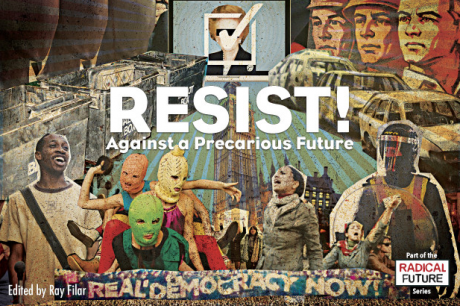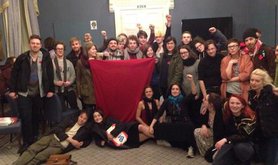Resist! Against a precarious future, edited by Ray Filar, is the third book in the Radical Future series: publications by young activists, journalists and artists calling for radical alternatives to the status quo. We're interested in social justice, liberation and collectivity, and the ways young people are organising to create change. If you think mainstream politics is a dismal failure and you still have hope we can do better, Resist! is for you. It can be downloaded for free here.

Resist! cover art by Yoav Segal.
Imagine that it’s 2025 and the world of work has changed. Today, we do labour out of passion, not obligation. Nobody has a low-paid job or has to balance multiple jobs just to make rent. Work gives us meaning and direction, but it does not define who we are. The three day working week means we have time to spend with friends and family, to contribute to our communities and have a say in how society in run.
There is no unpaid intern working for a boss on a six-figure salary; one person is not paid 10 times another. Pay is allocated equally and fairly depending on the time and skills each person has contributed that month. Holiday and sick pay are mandatory. Everybody has input into how the organisation is run. Colleagues are equal: when decisions are made they are made together. The profit a company makes gets shared between the people who make it possible – the workers, not some distant shareholders. In this labour market, competition and inequality is reduced, and so are the feelings of injustice and worthlessness felt by many.
This new economy is directed towards solving social and environmental problems rather than creating them. Companies focus on protecting the rainforest rather than destroying it, on creating renewable energy rather than drilling more oil out of the ground, on making technologies that empower communities rather than companies, on building affordable and sustainable housing rather than expensive city apartments. The creative energy of musicians, artists and designers is directed towards helping people overcome addiction, inspiring youth, exploring ideas, generating debate or building community, not towards advertising and encouraging people to buy things they do not need, or making them feel inadequate.
In 2025 work generates a fair income, enables us to do what we love and to have a positive impact. Our economy is based upon principles of democracy, equality, sharing and sustainability.
But in 2015, this seems like a utopian dream. It would require a complete overhaul of the system in which we currently live. Could our actions create such a future?
Who will make change happen?
There are limits to the change we can create without a widespread redistribution of wealth and power in the economy. Prior to the overthrow and reconfiguration of the state, there are already a number of existing proposals for how we could create work that is more equal and fulfilling. This chapter will consider four: worker co-operatives, the three-day working week, basic income and freelancers’ unions. The young generation has the capacity to push for these kinds of radical changes. But how would we get there from our current situation?
Co-operatives
A co-operative business is a specific type of organisation, one which is run and owned by workers, rather than stock market shareholders. In a co-operative, workers have an equal say over how the business is run as well as an equal share of the profits. Co-operatives reshape the social and environmental impact of our labour, and the way in which we work together to achieve it. Contrary to the idea of the ruthless individual entrepreneur portrayed in television shows like The Apprentice, they offer a supportive and collaborative model of entrepreneurship that is about working together to improve society, not fighting to be the best and sole person at the top. At least in principle, co-operatives aim to create both an economy directed towards positive social and environmental change, and one that is more equal and democratic.
In 2012, I was one of the many graduates leaving university and entering the world of work. I had heard about youth unemployment, about how competitive the ‘graduate market’ was, but I had a good degree, work experience and had spent time volunteering. I thought I would be fine. How wrong I was. I applied endlessly for jobs, but eventually had to move back home, going back to the waitressing job I had before university. During this time I got an interview for an unpaid internship at a youth organisation in London. Whilst undergoing the rigorous assessment process to see whose free labour the charity would choose, I asked how many other young people had applied for this position. The answer: 150.
This was a ‘light bulb moment’. 150 young people applying for one unpaid placement, supposedly to empower other young people … what was going on? This got me thinking, how can we stop competing and start co-operating to create change in a way that enables us to also survive?
I started an organisation called AltGen, that supports young people to set up co-operative businesses as a collaborative solution to youth unemployment, as well as a practical way to build a more equal and sustainable economy that we can be in control of. We provide start up grants, business advice and mentoring to help young people start co-ops, as well as running educational workshops and campaigning on a national and European level.
Worldwide, 1 billion people are already members of a co-operative. That’s one seventh of the world’s population. There are over 6000 co-operative businesses in the UK. They also exist in all sectors of the economy: there are co-operative schools, art galleries, web design agencies, architects, construction firms, doctors’ surgeries and record labels. The central point is the workers have an equal say over how the business is run, equal share of the profit, and care about the impact of their work on people and the planet.
For our generation co-operatives can combine the freedom of freelancing, of being your own boss (choosing who you work for and when) with the security, support, workers’ rights and benefits that are supposed to accrue to employees in a traditional business. Co-operatives can change our experience of work in the here and now, and redistribute power and wealth generated through business activity. Yet it is important to acknowledge that the co-operatives still function within the current capitalist economic paradigm: on their own they are not a significant enough threat to fundamentally change the system.
Setting up co-operative businesses is one way that our generation can begin to change the nature of work right now. We can choose to co-operate instead of compete; to do something we love instead of something we hate; to have a say over our work; and a fair share of the profit.
Universal Basic Income
Universal Basic Income (UBI) is the idea that every citizen – regardless of employment, earnings, age or gender – should receive a guaranteed minimum income from the state: a single weekly or monthly monetary payment with no stipulations as to how it, or the time of its recipients, is spent.
This idea is gaining traction around the world and across the political spectrum. It has been argued for from left, liberal and communist perspectives by the likes of Stuart White, as a way to alleviate poverty, to ensure all citizens’ basic needs are met and to significantly reduce inequality. The Equality Trust suggest it will reduce crime and mental illness, and improve levels of health and education. On the other end of the spectrum, even right wing economists like Charles Murray support it, for reasons linked to increasing entrepreneurial activity and decreasing state bureaucracy.
It is a core policy of the Green Party in the UK, and it recently went to referendum in Switzerland – a process that requires over 100,000 signatures. In the Swiss example, every adult would receive 2500 Swiss Francs a month, equivalent to £1725. The Green party proposal suggests £72 a week per person, equivalent to the current weekly Jobseekers’ Allowance for over 25s.
The theory is that UBI enables all citizens to at least meet their basic needs. UBI would replace the current means-tested state benefits model. It could create help to create a new landscape for the labour market.
Firstly, UBI would reduce the likelihood of people remaining stuck in a poverty trap. Since the 2008 financial crisis it has become increasingly impossible to survive on wage labour. In real terms, wages in the UK have declined nine per cent in the last five years, whilst in the same period the cost of living has risen 25 per cent. Mass unemployment and the reduction of state welfare support have also taken their toll on our ability to survive. Whether in or out of work, poverty is a reality for millions of people living in the UK, despite the fact that we live in the world’s sixth largest economy.
Secondly, it would give people greater freedom to choose work that they are actually interested in and passionate about: a choice based on desire rather than necessity. Many people do jobs they hate just to survive, just as many people know there is no point to the work they do, as David Graeber highlights in his writing on ‘bullshit jobs’. Creative potential and talent is being wasted, as people struggle to survive, rather than contributing to the development and progression of society.
Critics of UBI suggest that it would lead to people doing no work at all. But experiments with basic income schemes in North America and Namibia have shown that not only did most people continue to work, but that it significantly increased entrepreneurial activity and the generation of new ideas. Even Google understand the benefits of allowing the space and freedom for their staff to pursue their own interests. Gmail was invented during ‘20 per cent time’, whereby employees can spend up to 20 per cent of their time doing what they want. Unfortunately the time is harnessed to corporate, capitalist ends: all ideas are owned by Google.
Finally, and importantly, UBI would allow everyone to reap the benefits of the technological advancements of the last 100 years, including working fewer hours. Keynes predicted in the 1930s that by the twenty-first century we would be working 15 hours per week, yet in the UK today we have the highest working hours in Europe. With the advancement of technology, there has been a decrease in the amount of human labour needed; this is leading to mass job cuts and poverty. UBI and the three-day working week combined would address this issue, leaving us with more free time to spend as we choose.
One valid criticism of UBI is that no-one would want to do the jobs that are not particularly enjoyable and inspiring: working at a check-out till, data entry or cold calling. Many of these jobs are for companies that may not be needed; others that are necessary could be automated where possible. Yet there are also jobs that people may not find enjoyable that are needed for society to function, such as collecting rubbish, driving buses or fixing street lamps.
What would be the fairest way to ensure that these essential services are still provided? My suggestion is something similar to national service, a non-militaristic citizens’ service that everyone does for one year between college and further education or work. You contribute to society for one year of your life, and know that these things will be provided for the rest of your life. This would potentially have some impact on peoples’ respect for, and solidarity with, the workers doing these jobs.
This is just a suggestion. Divorced from wider social change UBI could too easily be co-opted by the state, becoming corrupt, authoritarian, and nationalistic. In combination with other radical restructuring, it could increase solidarity, respect and a culture of mutual aid in society.
Freelancers' Unions
There are also a number of freelancers' unions and co-operatives being created to provide protection and support specifically for freelance workers. Many of the more traditional trade unions are not structured to support the growing generation of freelancers. But some old unions have adapted, including the UK National Union of Journalists, and new unions are emerging specifically to support freelancers.
In the US, a completely new organisation called the Freelancers Union has been created. It has over 249,000 members and provides health insurance, disability allowance, and pensions as well as campaigning for a ‘new form of mutualism’ that supports freelance workers being in control, collaborating together and serving the community.
Across Europe, exciting models are emerging too. In Holland there is ‘Broodfunds’, translated as ‘Bread Funds’, where a group of self-employed people regularly put money aside to support members that become too ill to work for an extended period. In France freelancers’ cooperatives such as Coopaname are being set up to overcome the difficulty of claiming unemployment benefits, as well as to provide additional benefits. Here, in exchange for 10 per cent of your earnings, you can become an employee of the co-op. Coopaname offers business mentoring, advice, space for meetings and a supportive and diverse network of freelancers. SMART, in Belgium, has over 60,000 members, and offers an exchange of similar services, as well as paying and chasing up unpaid invoices on freelancers’ behalves.
These different models are trying to deal with the difficulty and isolation of freelance work in a number of different ways: creating a community of support, fighting for fair contracts and pay, collectivising resources to gain the same benefits as employees, and providing services that allow freelancers to focus on their creative work rather than on complex legal issues and on admin.
The Three-Day Working Week
The three-day or shorter working week has become an increasingly popular policy proposal in the aftermath of the economic crisis. It is advocated for by disparate figures, from the world’s second richest man, Carlos Slim, to leading medical practitioners. In the UK, many of us spend a majority of our time in work, but research suggests that working 21 hours – three days – a week could lead to significant improvements in the economy, human well-being and our impact on the environment.
After the economic crisis, the German government encouraged and subsidised companies to trim down working hours rather than jobs, enabling a continuation in consumption and demand, and ensuring that unemployment levels never rose as high as the rest of Europe’s. In the UK, a similar shift towards a shorter working week could be implemented gradually, alongside efforts to increase wage levels across the country: campaigns such as The Living Wage are already pushing us in the right direction.
The Living Wage campaign was developed after research showed that if you worked the average number of hours a week in the UK (40), at the minimum wage (£6.50 an hour), which averages to around £12,000 a year, £11,000 after tax, you would not be able to meet your basic needs. It suggests that a minimum wage, which people can actually live on – a living wage. This is currently £7.85 outside of London and £9.15 in London. The campaign has already succeeded in making 100,000 businesses, including many government departments, pay all their employees living wage. A three-day working week paid at living wage at least, alongside UBI, would enable us all to work less.
The most common criticism of the three-day working week is that it would weaken our economy. But many countries where people work fewer hours, such as Germany and the Netherlands, have a stronger and more robust economy than the UK. A three-day working week could help create a more healthy and balanced relationship with work for our generation, as well as a more equal and sustainable economy overall. Research by UK think tank nef suggests that the three-day working week would make our work more productive, that we would no longer have one half of the population overworked and stressed, with the other half unemployed and depressed.
A three-day week would give us time to relax, exercise, be with people we love, and reflect upon what we really value in life rather than just work and consume. It could contribute to greater gender equality, as everyone would have time to work and look after children if they so chose, balancing out the amount of undervalued and unpaid labour that women currently do. Finally, it could help us to reduce our carbon footprint, and to ensure that we all have more time to have to engage in politics, locally and nationally, to ask questions and to campaign for change.
Conclusion
The labour market has changed fast, specifically with regard to the atomisation and isolation of workers. Whilst this is supposed to give us greater freedom and control, it actually erodes the rights of workers, which previous generations spent years fighting for. Many young workers today can’t even imagine the idea of sick pay, holiday pay, guaranteed hours, set wages, a pension fund.
Not only is a more equal, sustainable and fulfilling future of work possible, it is already being built by people and movements across the world. The economy is anything but stable, and this crisis opens up space for us to create a better future.
Our generation stands at a crossroads: we could continue to accept the crisis we have been handed, fight one another for unpaid work, do jobs that we hate, and work 50 hour weeks. Or, we could refuse to participate in this set up any longer, and we could start creating something different and better. A shorter working week, UBI, workers’ cooperatives and freelancers’ unions represent four forms of possible radical change: young people can make this happen. It’s time to stop competing, and start collaborating, to create the kind of future we want to see.
Read more
Get our weekly email



Comments
We encourage anyone to comment, please consult the oD commenting guidelines if you have any questions.